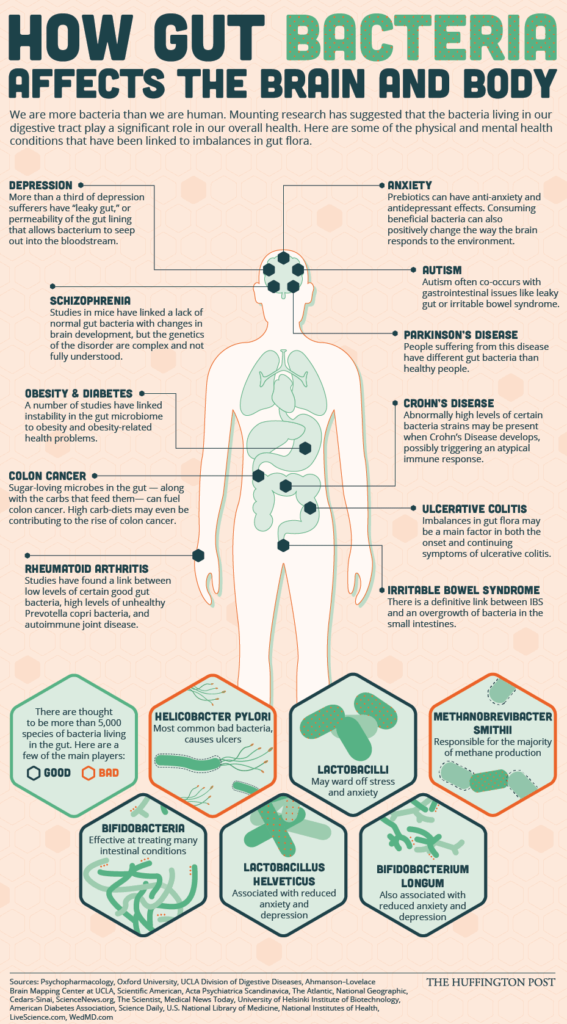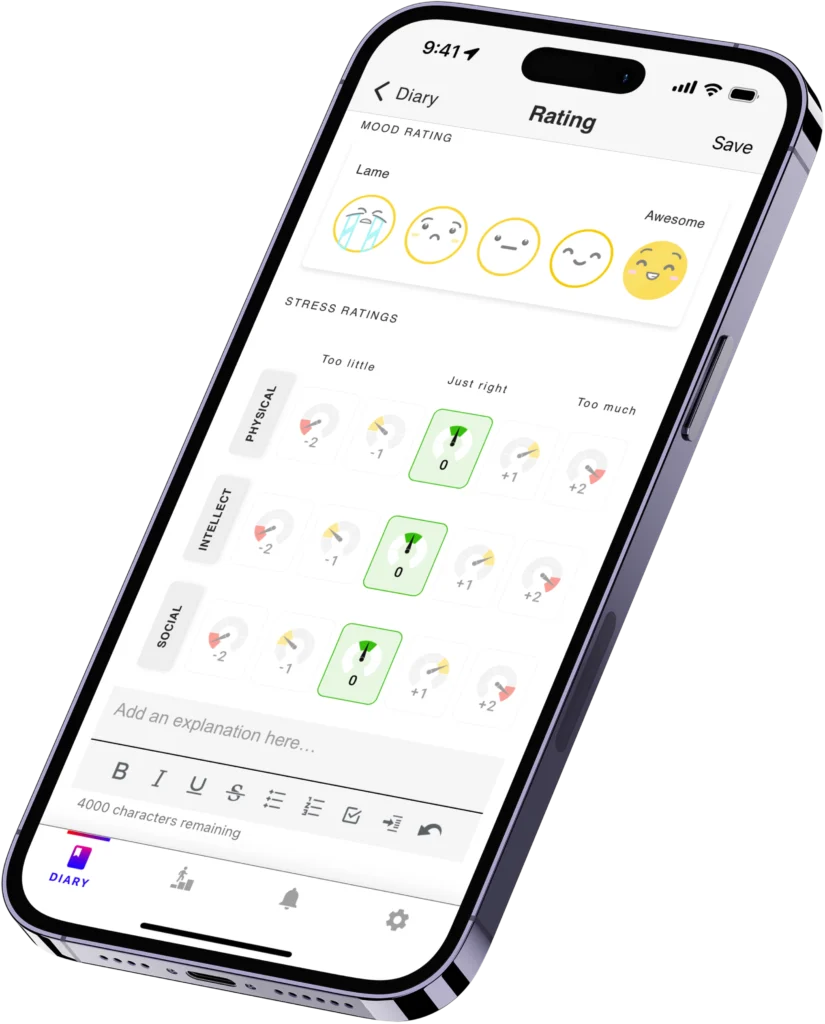Overview of gut bacteria and mental health
Welcome to the fascinating world of gut health and its surprising impact on mental well-being! In recent years, scientists have uncovered compelling connections between our gut bacteria and mental health, a relationship we’re just beginning to understand.
With the innovative Best Life app, tracking this connection becomes not just possible but also easy and insightful. This article delves into how you can harness the power of mood tracking and gut health monitoring to potentially enhance your mental health.
The bacteria within your body contribute to your health in many ways. These bacteria are known as a microbiome. Since they live inside each of us, each of our microbiomes is unique to our unique self.
Bacteria account for 90% of the cells in the body, and their genes outnumber our own by 100 to one
Colleen Shannon, Health Writer
Truly, the amount of influence gut bacteria has on our daily lives is currently immeasurable. Research is only now tapping into the untold secret influences our microbiome has on our health.
Understanding gut bacteria and mental health
The gut-brain axis is a complex communication network linking your gut and brain, influencing everything from your mood to mental health. Emerging research suggests that a healthy gut microbiome can positively affect this axis, potentially leading to improved mental health outcomes. It’s a groundbreaking area of study that underscores the importance of gut health in overall wellness.
The connection between gut bacteria and mental health is an emerging area of research within the field of psychobiotics, which focuses on how the gut microbiome affects the brain. Several key findings illustrate this connection:
Gut-brain axis
Your gut and brain talk to each other through a system called the gut-brain axis. This includes nerves, hormones, and how your body fights disease. The bacteria in your gut can affect your brain, changing how you feel stress, anxiety, and mood.
Neurotransmitter production
Some good bacteria in your gut make important brain chemicals. For example, they can produce serotonin, which helps control your mood. If serotonin levels are off, it can lead to feeling down or anxious.
Inflammation and immune response
The bacteria in your gut can influence inflammation throughout your body. Long-term inflammation is linked to mental health issues like depression. Changes in gut bacteria can lead to more inflammation, which might affect how you feel mentally.
Stress response
Your gut bacteria can also affect how you handle stress. When you’re stressed, it can change the bacteria mix in your gut. Similarly, if your gut bacteria are out of balance, it might make you react to stress differently.
Clinical studies and probiotics
Some studies look at how taking probiotics (good bacteria and yeasts) can help with mood and anxiety. These studies show that probiotics might help improve mental health, but more research is needed to understand this fully.
Probiotics that support gut bacteria and mental health
Probiotics are beneficial bacteria that support a healthy gut. Here’s a simple rundown of some common ones:

Bifidobacterium: Also in some dairy products, Bifidobacterium can ease digestive issues like IBS.
Saccharomyces boulardii: This friendly yeast helps combat digestive problems like diarrhea.
Streptococcus thermophilus: This one is usually in yogurt and helps break down lactose, making it easier to digest dairy.
Lactobacillus: This probiotic is often found in yogurt and other fermented foods. It’s great for digestion and can help if you’re lactose intolerant.
Lactobacillus acidophilus: Found in fermented soy products like miso and tempeh, it aids digestion and gut health.
Lactobacillus reuteri: Known for a variety of health benefits, from improving gut health to potentially boosting immunity.
Incorporating these probiotics into your diet through foods like yogurt, kefir, and fermented soy products, can help maintain a healthy balance in your gut. Remember, a happy gut contributes to overall well-being!
To put it simply…
Think of your gut as a mini-brain that talks to your actual brain. The tiny creatures in your gut can affect your thoughts and feelings. Keeping them balanced might help keep your mind balanced, too. This is why some people are looking at gut health to help with mental health problems.

Your gut and gut bacteria have a lot to do with your overall health and well-being.
Fermented foods and probiotics
Fermented foods and probiotics play a vital role in maintaining a healthy gut microbiome. Foods like yogurt, kefir, and sauerkraut introduce beneficial bacteria into the gut, which can positively influence mental health. Studies have found that diets rich in probiotics can improve mood and reduce stress and anxiety levels, highlighting a direct link between what we eat and how we feel.
Because of that, consuming fermented foods and probiotics helps maintain a healthy balance of gut bacteria, which can positively influence not just your digestive health but also your mental health due to the close connection between your gut and your brain.
Mental health tracking with Best Life
Before you can learn if a change in your gut bacteria impacts your mental health, you need a baseline for your mental health! However, this becomes easier when you realize just how many options there are to track your mental health. That’s because things like mood tracker apps and bullet journals have become an established practice for those improving their health as a whole.
Best Life’s mood tracking feature is a game-changer for anyone looking to understand the diet-mental health connection. By regularly logging your mood and emotional well-being in the app, you can start to see patterns and correlations.

For instance, you might notice improved mood on days when your diet is rich in fermented foods, underscoring the impact of gut health on mental states.
Nutrition tracking and gut health
Alongside mood tracking, Best Life’s nutrition tracking feature enables you to monitor your diet closely. This tool is invaluable for identifying which foods benefit your gut microbiome and, consequently, your mental health.
By keeping a detailed food diary, you can pinpoint which dietary habits favor your gut health. Things like:
- Identifying food sensitivities
- Balancing your diet
- Probiotic and prebiotic intake
- Identifying nutritional deficiencies
- Correlating diet with gut health symptoms
- Supporting weight management
In conclusion, nutrition tracking offers a detailed way to watch and change your diet for your best gut health. It helps identify problem foods, guarantee a balanced diet, and understand the relationship between what you eat, your gut bacteria and mental health.
Final thoughts on gut bacteria and mental health
The link between gut health and mental well-being is an exciting field of study, offering new avenues for improving mental health. With tools like Best Life, monitoring this connection becomes a part of your daily routine, opening the door to potentially profound health benefits.
Ready to explore the connection between your gut bacteria and mental well-being? Download Best Life today and embark on a journey to discover how your microbiome might be the key to a happier, healthier mind.

